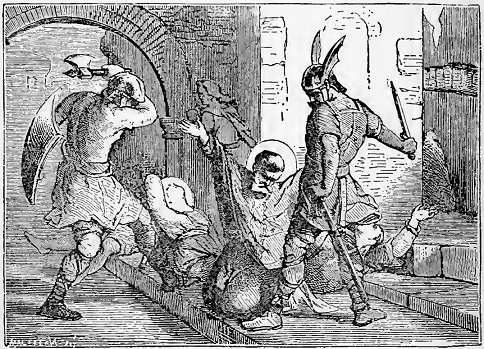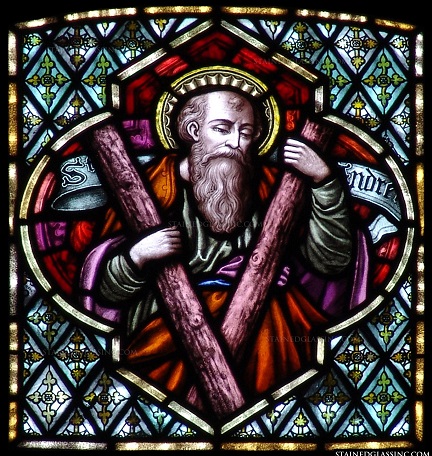Text: Romans 12:14-21, Luke 6:27-36

Who was Nicasius?
Nicasius was a bishop in Rheims, on the frontier of the Roman empire. This area had a Christian presence dating back to 260 AD.
In the new year’s eve of 407, a horde of Barbarians crossed the frozen Rhine River. To the Roman inhabitants of Gaul, it was called the Barbarian invasion. They sacked cities along the way.
Bishop Nicasius was said to have had a vision concerning this invasion, and he warned the people about it. They asked him if they should take up arms, but Nicasius responded, “Let us abide the mercy of God and pray for our enemies. I am ready to give myself for my people.”
When the Vandals arrived at the gate of the city, Nicasius attempted to slow them so that more citizens could escape. He met the advancing army with his companions: Jucundus, his lector, Florentius, his deacon, and Eutropia, his virgin sister. The Vandal army put him and his companions to death at his altar or the door of his church, while he was praying from Psalm 119: Adhæsit pavimento anima mea: Vivifica me secundum verbum tuum. “My soul clings to the dust; give me life according to your word!” (Ps. 119:25)
The legends have it that after the death of Nicasius, the Vandals were so scared, they left the area and left their plunder behind.

Application
Our Lord says, “27 But I say to you who hear, Love your enemies, do good to those who hate you, 28 bless those who curse you, pray for those who abuse you.”
St. Paul writes to the children of God:
“17 Repay no one evil for evil, but give thought to do what is honorable in the sight of all. 18 If possible, so far as it depends on you, live peaceably with all. 19 Beloved, never avenge yourselves, but leave it to the wrath of God, for it is written, “Vengeance is mine, I will repay, says the Lord.” 20 To the contrary, “if your enemy is hungry, feed him; if he is thirsty, give him something to drink; for by so doing you will heap burning coals on his head.” 21 Do not be overcome by evil, but overcome evil with good.”
How can Jesus say such a thing? How can it be that God’s instruction would be to roll over against the force of those who hate us?
These are hard words for us, because it doesn’t seem right or fair. Our world tells us to demonize those who hate or abuse us (or sometimes even just trouble us). Take away their power by whatever means necessary, destroy their reputation, seize their assets, remove them from memory.

But who was Nicasius, a bishop to take up arms? What chance did they have against this advancing army when the Romans soldiers had retreated to deal with other invaders? His priority was to save civilian lives…and the souls of the enemies.
Yes, the lives of his enemies. The lives of your enemies are precious in God’s sight. The life of the one who abandoned you, who hurt you, who cheated you in court. Their life is just as precious as yours to God. No matter how much the image of God has been smeared over by the filth of evil, God still priced their life with the precious blood of Christ.
“6For while we were still weak, at the right time Christ died for the ungodly. 7For one will scarcely die for a righteous person—though perhaps for a good person one would dare even to die— 8but God shows his love for us in that while we were still sinners, Christ died for us. 9Since, therefore, we have now been justified by his blood, much more shall we be saved by him from the wrath of God. 10For if while we were enemies we were reconciled to God by the death of his Son, much more, now that we are reconciled, shall we be saved by his life.” (Romans 5:6–10)
When we see those who are our enemies as human beings loved by God, rather than seeking to be rid of them, we see ourselves as witnesses to God who has had mercy on us.
When the Vandals crossed the Rhein, it was not just their armies. It was also their women and children—their families with them. They were fleeing for their lives against a ruthless invading force that had forced them out of their homes—the Huns. For the past 30 years, the Huns had been wreaking havoc on the Germanic peoples and forcing them as refugees into the Eastern Roman empire. This doesn’t excuse their actions of killing an unarmed bishop and his attendants, or robbing from the people of Gaul. But rather, as Nicasius said, “Let us abide the mercy of God and pray for our enemies.” For that is what God, who rules over the nations, who desires the salvation of the nations, has commanded us.

So, who are our enemies today? Woke idealogues? Democrats or republicans? Abortionists? Illegal immigrants? Do we take a cue from the world and demonize the people who belong to these movements, dehumanizing them?
Instead, let us entrust our lives to our Lord, who “23 When he was reviled, he did not revile in return; when he suffered, he did not threaten, but continued entrusting himself to him who judges justly.” (1 Pet. 2:23) And see those who set themselves against us not according to their sins (“3If you, O Lord, kept a record of sins, O Lord, who could stand? 4But with you there is forgiveness; therefore you are feared.” Psalm 130:3–4), but according to God’s mercy shown to His enemies, His power to convert them, and to save them from the coming judgment.
Let Nicasius and his companions remind us this Advent that Christ came into the world to save all people, and that His desire now is that disciples be made of people from every nation. In the Name + of Jesus. Amen.









